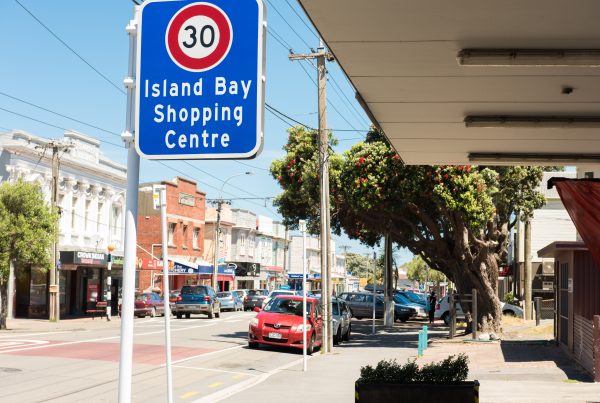
Ironically, the shops selling actual sex products themselves face much stricter retail and advertising standards than anyone else, as they are generally categorised within the shade of grey (I hear there are 50) that exists between regular retail and the commercial sex industry.
In Wellington, adult-product retailers have been challenging these double standards by developing sex-positive, mainstream stores aimed at everyday people and conceptually positioned totally separately from the night-time back-alley sex industry. And as these businesses make the societal transition from red light to daylight, mainstream retail awards and recognition are helping them spread their own good vibrations among the city’s regular retail environment.
One such business is D.VICE, a sex-toy manufacturing company with shops around the country, including the brightly lit and inviting one on the corner of Dixon and Willis streets.
Owned by Wellingtonians Wendy Lee and Ema Lyon, D.VICE promotes philosophies based around education and the normalisation of sexuality. A number of psychological measures employed in their stores are designed to help people feel comfortable and within a mainstream environment, and they don’t sell porn. Clean, bright and open-plan spaces with glass shelves provide a boutique feel, with adult toys displayed out of the box for customers to handle and examine. An online magazine and website forums publish informative, no-holds-barred articles on all the sexual topics you could imagine, and some you probably couldn’t.
Around 20 percent of D.VICE’s stock is self-manufactured at a factory that is the only one of its kind in New Zealand, and probably Australia too, says Lee.
“D.VICE was born out of our frustration,” she explains. “We wanted to be able to access great sex toys while in a comfortable environment. Finding neither, we began manufacturing quality products and later opened our first store in Wellington.”
Back in 1998, an evening course intended for students to make moulded plaster garden gnomes and the like, saw Lee and Lyon furtively experimenting with creating phallic shapes at the back of the class. Later, with a little assistance from Weta Workshop’s model-making experts, the pair honed their skills, marking the beginning of a successful manufacturing operation that is guided today by feedback from a loyal and surprisingly large customer base, especially in Wellington, which actually has really high rates of vibrator ownership, claims Lee.
“We want all our products to be long-lasting and safe to use, and we tend to be very conscious of the materials they are made from, making sure they are body-safe,” she says.
Adult-toy sales in general have definitely trended upwards in recent years, with sexuality becoming a slightly less taboo subject thanks in part to successful TV shows like Sex and the City and Girls, and guilty pleasure publishing phenomenon Fifty Shades of Grey. Lee says the latter, featuring a sexually charged and controversial relationship of female submission and bondage, has had a noticeable impact on the adult-toy industry, both here in Wellington and across the country. The movie adaptation, released on Valentine’s Day last month, provided a double whammy, so to speak, for adult-product retailers.

Nicola Relph, of Adult Toy Megastore
Fellow Wellington sex-toy seller Adult Toy Megastore has noticed a similar influence, says co-owner Nicola Relph, with more everyday people getting the nerve up to buy and try adult products.
“For us it’s about giving Kiwis a sense of empowerment,” she explains. “Our target market is the general population; this is not a backstreet business.”
The online-only store differs from D.VICE in that they do stock pornography, but a commitment to sex education and demystification aligns the values of the two companies.
Relph says the company, which she owns with husband Craig, has a comprehensive website that is more than a catalogue in that it has become a sounding board for many people who want to share and talk about their sexual side, or post feedback on the products.
Despite the online nature of the business meaning geographical location is not as important, Relph is certain they have benefitted from being in the capital. “We would have based it here anyway because it’s our home,” she says. “We’re Wellington born and bred, and our employees are too, but we find we meet more open-minded attitudes here generally. Open-minded and creative.”
The relatively small size of the city makes for easier partnering with other business too, including radio stations and event organisers. “We can be more restricted on advertising, but as we are an online business with no physical store there aren’t so many challenges,” says Relph.
These are challenges known all too well to Lees and Lyon, who were turned down for no less than 15 Ponsonby Street retail locations before finding the one their Auckland store currently occupies. The irony is, Lee says, that you can walk into almost any dairy or petrol station and buy explicit pornographic material, yet the same rules don’t apply to them.
Relph agrees. “We have no relationship with brothels or that sector and we’re not part of that network. We try to keep this more mainstream,” she says, “yet these restrictions do apply to us.”
Both women obviously have a clear grasp of exactly where their businesses sit within New Zealand retail, including the fact that they are dealing with a handle-with-care area considered taboo by many.
As they, and other adult-product businesses, seek to define themselves as promoting healthy sexuality and confidence, alongside some frank sex education, it doesn’t seem right that they are affected by somewhat draconian regulations. And all this while society at large becomes increasingly affected by the osmosis of porn into our daily media diet, influencing what many young people are growing up to think sex is, while nobody appears to bat an eyelid.
Although the promotion of adult products definitely does require sensitivity — locations frequented by children spring to mind as an obvious no-no — the philosophies being promoted by these mainstream businesses deserve more credence, and it’s pretty obvious they shouldn’t be tarred by the same regulatory brush as brothels and strip clubs.
However, some lessons may have been learned along the way, as D.VICE found out in 2009 when they angered the Catholic Church by displaying a billboard showing people praying in a church with their eyes closed, except for a woman smiling and a tagline below for a discrete sex aid that could be used while doing other things. Fairfax Media reported Wellington Catholic Archbishop John Dew as saying it was “unnecessary and distasteful” to associate the church and a sex shop, but Lee was unrepentant, saying the billboard never meant to cause offence — a statement backed up by no follow-up complaints with the Advertising Standards Authority.
Despite facing extra restrictions and controversy, both Lee and Relph see a bright future in their industry, with technological innovations (giving your partner a buzz via remote control app anyone?) and increasing mainstream societal acceptance, including from those in the retail sector, meaning the industry is experiencing constant growth.
“We do come up against issues the normal businesswoman wouldn’t,” says Lee, “but that won’t stop us. Our passion is to bring sex toys and sex information to customers in a positive, fun and affirming environment with a commitment to promote positive attitudes towards healthy sexuality.”
It must be working then, as people return to shop at the stores, read the articles and discuss the ins and outs of the products, probably literally, via the web forums.
Creating that positivity, freedom and confidence for people is what really counts, both Relph and Lee agree, and with sexuality such an inherent part of human existence this must have a knock-on effect into other areas of life.
Providing education and making a healthy version of sexuality more mainstream, whatever that may be on a personal level, seems to be a good way to help counter the raft of negative and judgemental sexual imagery we are subject to every day. If confronting one of society’s last big taboos honestly, sensitively and head-on, as these businesses are doing, achieves that in any way, then surely that can only lead to a metaphorical happy ending.



